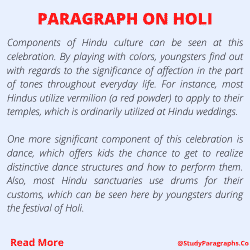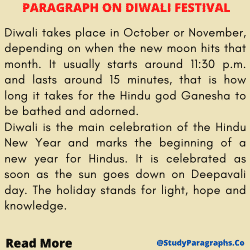Value, Importance And Celebration Of Janmashtami Festival Paragraph
Read below short and long paragraph about Happy Janmashtami Festival it’s value and importance for all class students and children.
Paragraph On Janmashtami Festival And It’s Importance For Students
These are common in students mind about Janmastami Festival, this paragraph will explain the answers of following questions frequency asked by students.
- What does Janmashtami celebrate?
- Jow is janmashtami celebrated?
- Why is it important to keep a home clean and tidy on janmashtami ?
This festival means the birth of Lord Krishna. On this day the children are disguised as Lord Krishna and Radha and the families visit each other at home to wish Happy Janamastmi. If there are temples nearby, people also go there to pray before going to social gatherings. It always falls in the month of August-September.
In whole country, every Hindu festival has its own meaning. Different festivals have different meanings, but they all teach us good values to live by.
Every anniversary teaches us to practice cleanliness in mind, body and soul. For example, the festival of Karvachauth is celebrated by married women who pray for a long life for their husbands and fast for their welfare. Similarly, Janmashtami teaches us the value of love for others, love for nature, and love for God. We can also learn good values like grace, sacrifice, etc. from these festivals. Every year we see people who celebrate different festivals with full enthusiasm, so it is important that we organize the celebrations and keep all these points in mind.
A clean home not only looks beautiful, it also increases the happiness quotient around you. On this day, it is important to clean your home before starting the preparations for the celebrations. The food you serve should be properly packaged to prevent dirt or germs from entering. Keeping your surroundings clean will ensure that everyone around you stays healthy and happy.
Janmashtami is a festival that is celebrated with great enthusiasm by Hindus all over India, especially in states like Gujarat, Maharashtra, Uttar Pradeh etc. where the people are very religious. It celebrates the birth of Lord Krishna, who is also called Vasudev, which means the son of Vasudeva. On this day, people send cards, messages, gifts, and eat lots of delicious dishes.
Greetings on Janmashtami
I wish that this festival will bring joy and happiness into your life. May Lord Krishna bless you with all the joy, peace and prosperity in your life!
Shubh Janmashtami
Janmashtami is a Hindu festival celebrated every year on the 8th day of the dark half of Bhadrapada month according to the traditional Hindu lunar calendar in India.
On this day, Lord Krishna is said to have been born in King Kansa’s prison. Since he was born dark, he was given a name (Krishna). To celebrate this event, people celebrate Janmashtami by doing puja and alankaran (decoration) in their homes and performing abishekas (ceremonial baths) in temples dedicated to Lord Krishna and Radha.
The highlight of the festival is when people help each other by offering fruits, flowers and clothes. They also chant bhajans (devotional songs) in praise of Lord Krishna and this helps them gain inner satisfaction.
On Janmashtami, people decorate their houses with rangolis (colorful patterns), lights, kalashas, images of Krishna and Radha, etc. to welcome Lord Krishna into their homes. People also offer prasad (food) like laddus, puris are specially made for the occasion. They also perform abishekas in temples dedicated to Lord Krishna before breaking their fast.
Conclusion
Every festival teaches us to practice cleanliness in mind, body and soul. For example, the festival of Karvachauth is celebrated by married women who pray for a long life for their husbands and fast for their welfare. Similarly, Janmashtami teaches us the value of love for others, love for nature, and love for God. We can also learn good values like grace, sacrifice, etc. from these festivals.

Hello! Welcome to my Blog StudyParagraphs.co. My name is Angelina. I am a college professor. I love reading writing for kids students. This blog is full with valuable knowledge for all class students. Thank you for reading my articles.




